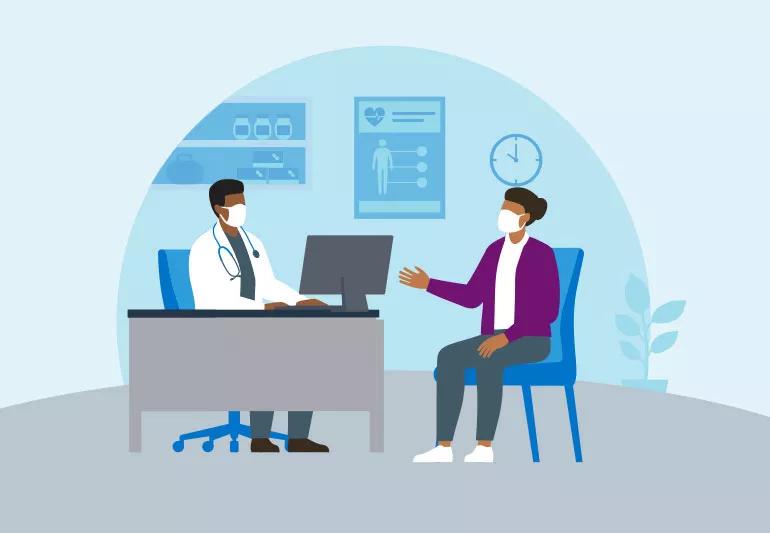From odors to colors, it’s more than OK to ask your doctor these questions

It’s not always easy to talk about weird things going on with your body. In fact, it can be downright uncomfortable to admit when something doesn’t seem right. You don’t want anyone to minimize what you’re experiencing either by laughing at it or dismissing it outright. And verbalizing that something is wrong can be scary because then it feels more real.
Advertisement
Cleveland Clinic is a non-profit academic medical center. Advertising on our site helps support our mission. We do not endorse non-Cleveland Clinic products or services. Policy
But you don’t have to deal with health anxieties by yourself. Your doctor is there to answer any questions you might have about your body — yes, even (and especially!) the embarrassing ones. Chances are good they’ve seen and experienced what you’re going through and can offer some insight. Or if they think something is going on with your health, you can work together to find solutions.
Here are some embarrassing questions you might have encountered in your own life that are worth bringing up to a doctor.
The color of your vaginal discharge can vary quite a bit and depend on many factors, including where you are in your menstrual cycle.
But discharge that’s yellow, green or gray signals there might be a problem — and thick, cottage cheese-like discharge is often the sign of a yeast infection. It never hurts to ask your healthcare provider what’s normal.
“Be prepared to discuss the color, consistency and smell of the discharge, as well as any itching and whether it appears related to having sex or your menstrual cycle,” says Ob/Gyn Oluwatosin Goje, MD.
Generally, if your vagina has a strong odor — one that you might describe as “fishy” — that can be a sign of bacterial vaginosis, a very common vaginal infection. This develops when the pH balance of your vagina becomes imbalanced. Bacterial vaginosis can be treated by antibiotics either in pill form or a vaginal gel or ointment. You can decide what’s best in discussion with your doctor.
Advertisement
“Education is key, because BV can cause a lot of emotional and psychological distress,” says Dr. Goje.
Farting — or the release of excess air through your intestinal tract — is both normal and natural. (To some kids, farting is also hilarious.) There are many reasons why you might be farting a lot, including medications, your diet and even childbirth. Being overly gassy can sometimes be a sign of sleep apnea or (rarely) colon cancer, so if frequent farting persists and bothers you, talk to a doc.
“If the amount of gas makes you uncomfortable, consult your local GI [gastrointestinal] physician for evaluation and recommendations,” says gastroenterologist Christine Lee, MD. “If it is impacting your life in a negative way, you should have it checked out.”
How often should you pee? According to urologist Petar Bajic, MD, it really depends on what you drink — for example, alcohol and caffeine can make you pee more — how much you drink and even your bladder size. Some people pee 10 times a day; other people pee four times a day. One day you might pee a lot; on other days, not much at all.
But if your usual pee routine is very different very suddenly, that could be a sign something’s up. Having to pee more could mean you have a urinary tract infection, an overactive bladder or (more seriously) diabetes.
Bad news: When you get older, you have to pee more often — and that includes peeing more at night. But if you’re between the ages of 65 and 70 and using the bathroom more than twice a night (or over 70 and peeing more than three times each night), that’s cause for concern.
“If you’re urinating more than 10 times in 24 hours, that may be too much,” says urologist Emily Slopnick, MD.
Having to urinate frequently can be a sign of a health condition, like a prostate problem or diabetes.
But in general, if your sleep interruptions are becoming an issue, limit your intake of fluids to two hours before bedtime and take any diuretics in the afternoon. And keep track of what you’re eating and drinking, so you can pinpoint what might be causing you to pee so much at night.
When you’re healthy and hydrated, your urine color should be somewhere between colorless and the color of light straw and honey. When you’re dehydrated, your urine will be more concentrated and, therefore, darker yellow or amber.
“It’s completely normal for the color of your urine to vary a little day by day,” says Dr. Bajic. “But it should stay within a certain range of yellow.”
Drastic changes could point to either innocuous things (you’ve recently eaten certain foods, for example) or more serious issues (blood in your urine, a liver condition). Monitor what’s going on — and if you’re worried by the changes you see, call the doc.
Advertisement
Your pee shouldn’t have an odor. But Dr. Bajic notes that being dehydrated can give your urine a slight smell, while coffee drinkers might also notice a whiff of something different.
Detecting an even funkier pee smell might mean something else is up. An ammonia smell might point to a urinary tract infection (UTI) or kidney stones. Pee that smells sweet or fruity might be a sign of diabetes or hyperglycemia (high blood sugar).
Don’t worry: It’s quite common for men to have trouble peeing, especially as they age into their 50s and beyond. That’s often due to an enlarged prostate. But being strategic about hydration, peeing when you feel like you have to go and avoiding supplements are all good solutions.
“When you have to go, go,” says urologist Brad Gill, MD, MS. “Don’t hold it in because the bladder is not as patient as it was when you were younger.”
Dr. Lee notes it’s not unusual to have poop that’s a different color. For example, if you’re eating a lot of green veggies (a good thing!) your poop might also be greenish. However, green poop could also signal a side effect of certain medications changing your gut’s bacteria flora — or things like irritable bowel syndrome, a parasite, or even a bacterial or viral infection.
Advertisement
Additionally, poop that’s any color but brown — in other words, a hue that’s reddish, greyish, yellowish or blackish — could signal something not great is going on with your body. In these cases, a doctor’s visit is definitely in order.
Dr. Lee also explains that poop can also be all kinds of different shapes. Ideally, it should be log-like with cracks on the surface. However, watery or fluffy diarrhea could mean you’re sick, have food poisoning, or some other digestive or intestinal issue. If you have consistent diarrhea, definitely see a doctor.
Stinky feet are never pleasant. But chances are good if you’re an athlete or exercise regularly, you’ll have smelly feet on occasion.
“Feet smell like vinegar when they sweat too much, and the moisture interacts with bacteria on your skin,” explains podiatrist Joy Rowland, DPM. “The bacteria actually eat your sweat, and this creates an acidic byproduct that smells like vinegar.”
But you can also have smelly feet if you have a health condition that might make you sweat excessively— like diabetes, Parkinson’s disease or a thyroid condition — or the skin disorder hyperhidrosis. Washing your feet daily, wearing moisture-wicking socks and switching up your shoes frequently all help — though if nothing keeps the smells at bay, you may need to chat with a healthcare provider.
Advertisement
When you reach REM sleep — the period of sleep where you dream the most — your body is paralyzed. That protects you from acting out your dreams and potentially hurting yourself or your partner.
But if you have REM sleep behavior disorder (RBD), your muscles aren’t paralyzed, meaning you might talk in your sleep or physically lash out and not even know it. “Because a switch in the brainstem or brain is no longer immobilizing you, your muscles are free to carry out the actions in your dreams,” says sleep specialist and neurologist Marri Horvat, MD, MS.
Not only could this cause stress to your relationship, but RBD is also linked to developing certain neurodegenerative disorders.
To mitigate these effects, you might be able to take medication to treat RBD or rearrange your bedroom with safety in mind. A conversation with a doctor can help determine the best course of action.

Sign up for our Health Essentials emails for expert guidance on nutrition, fitness, sleep, skin care and more.
Learn more about our editorial process.
Advertisement

Red flags include feeling unheard, unimportant or unwelcome in your provider’s office

Signs are what your provider can see, but symptoms are what you feel or experience

Screenings and tests done during a wellness check can uncover hidden health issues

An annual physical exam is important for many reasons, including your chance to ask questions

This iconic medical tool has an enduring role

Simple tips to make your visit more effective

It can offer you peace of mind and more information

Smart choices will take you far

Even small moments of time outdoors can help reduce stress, boost mood and restore a sense of calm

A correct prescription helps your eyes see clearly — but as natural changes occur, you may need stronger or different eyeglasses

Both are medical emergencies, but they are very distinct events with different causes